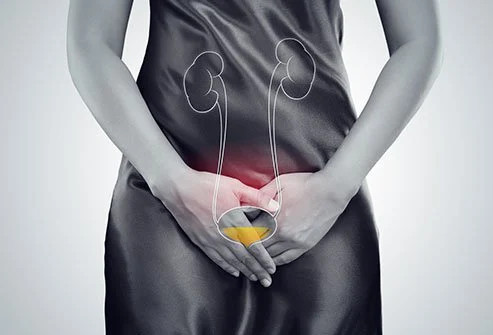Definition
Neurogenic bladder is a condition in which a person is unable to control their bladder due to a central nervous system disorder affecting the brain and spinal cord. The bladder's normal function of storing and releasing urine at will is disrupted due to the lack of coordination in the bladder muscles. This coordination is typically controlled by nerve cells, so damage to the central nervous system can result in the loss of the ability to urinate normally.
Two types of disorders can occur hyperactive bladder or inactive bladder.
Causes
The causes of neurogenic bladder can be divided into genetic diseases and trauma or other illnesses. Disorders in the central nervous system that can cause neurogenic bladder include:
- Hydrocephalus: fluid buildup in the brain.
- Cerebral palsy.
- Shy-Drager syndrome.
- Spinal cord disorders.
- Multiple sclerosis.
- Sacral spinal cord trauma.
- Peripheral nerve damage, such as from diabetes mellitus or AIDS.
- Stroke.
- Parkinson's disease.
- Trauma or a history of spinal surgery.
- Heavy metal poisoning.
Congenital abnormalities that can cause neurogenic bladder include:
- Spina bifida: a condition where the baby's spine does not form properly during the first month of pregnancy.
- Sacral agenesis: characterized by the absence of part of the sacrum or pelvis.
- Cerebral palsy: a chronic condition where a person loses coordination of movement and posture, which can be caused during pregnancy or after birth.
Risk factor
Factors that can increase the risk of neurogenic bladder include:
- History of spinal cord or nerve disorders, including congenital conditions like spina bifida.
- History of diabetes mellitus, due to neuropathy or nerve damage, a complication of diabetes mellitus.
- History of stroke.
- History of central nervous system damage, such as head injuries.
Symptoms
Symptoms of neurogenic bladder can resemble those of other diseases. Common symptoms of neurogenic bladder include:
- Weak or dribbling urine flow.
- Frequent urination, usually more than eight times a day.
- Urgency, the strong urge to urinate immediately.
- Pain during urination, which may indicate a urinary tract infection.
- Kidney stones.
- Loss of sensation that the bladder is full.
Diagnosis
In addition to a physical examination, further tests to help diagnose neurogenic bladder include:
- Urinalysis: to assess urinary tract infections that can cause symptoms like incontinence or the inability to hold urine.
- Tests to detect kidney stones.
- Urodynamic tests: to evaluate urination ability, including the ability to hold urine, bladder pressure, and urine flow. Sensors are placed on the skin around the bladder to assess the nerves and muscles controlling urination.
- Radiological examinations, such as MRI or CT-Scan, to check the brain and spinal cord.
- Cystoscopy: an invasive examination using a small telescope to view the urinary tract.
- Bladder function tests require time and a lengthy process due to the similarity of symptoms with other diseases.
Management
The goal of treating neurogenic bladder is to prevent kidney damage and control symptoms. If kidney damage can be prevented and symptoms managed, it can improve the quality of life. Treatments to alleviate symptoms include:
- Medications to relax the muscles around the bladder or activate the nerves.
- Catheter use: a tube inserted into the urinary tract, usually for inactive urinary tracts, to help empty the bladder when full.
- Botox injections: injected around the bladder muscles to prevent continuous contraction. However, this treatment's effectiveness diminishes over time and may require future repetition.
- Nerve stimulation therapy: performed when medications and lifestyle changes fail, involving placing wires near the nerves to stop electrical activity causing bladder problems.
- Surgery: for some patients, surgery may involve inserting a device to replace the sphincter muscle (which controls urination), creating a new urinary hole, or removing weak muscle parts, leaving only healthy muscles.
Lifestyle changes can also help treat and reduce neurogenic bladder symptoms, such as:
- Scheduling urination times to train bladder control.
- Avoid foods and drinks that irritate, such as spicy foods, coffee, tea, and carbonated drinks.
- Double voiding: a technique to ensure the bladder is empty by waiting a while after urination and then trying to urinate again.
- Exercising pelvic floor muscles to strengthen them.
Complications
Complications from urination disorders can range from skin problems to kidney issues. Prolonged skin contact with urine can irritate and damage the skin, leading to ulcers or deep wounds and bacterial infections from open sores. Holding urine for long periods increases the risk of urinary tract infections. In patients with nerve disorders, typical symptoms like back and abdominal pain may not appear, leading to late detection of severe damage. Patients using catheters may develop urinary tract injuries, infections, and bladder stones.
Prevention
Most causes of neurogenic bladder cannot be prevented, but actions that can be taken include:
- Controlling blood sugar levels in diabetes mellitus to prevent peripheral nerve damage leading to neurogenic bladder.
- Using protective equipment, such as helmets and safety belts, to prevent head and spinal injuries.
When to see a doctor?
Warning signs of neurogenic bladder include:
- Inability to urinate or pass urine.
- Symptoms of urinary tract infection, such as burning during urination with pain and frequent urination.
- Frequent urination in short intervals with only a small amount of urine.
Looking for more information about other diseases? Click here!
- dr. Yuliana Inosensia
-
Neurogenic Bladder: Symptoms, Diagnosis & Treatment - Urology Care Foundation. Urologyhealth.org. (2021).
-
Gill, B. (2021). Neurogenic Bladder: Overview, Neuroanatomy, Physiology and Pathophysiology. Emedicine.medscape.com.
-
Neurogenic Bladder: Symptoms, Causes, Tests and Treatment. Cleveland Clinic. (2021).
-
Neurogenic Bladder. Hopkinsmedicine.org. (2021).
-
Neurogenic bladder: MedlinePlus Medical Encyclopedia. Medlineplus.gov. (2021).
-
Neurogenic Bladder—Adult | Winchester Hospital. Winchesterhospital.org. (2021).
-
Neurogenic Bladder | UVA Health. Uvahealth.com. (2021).







